 Perfect is NOT reality, especially in Parenting!
Perfect is NOT reality, especially in Parenting!
I had two daughters who had babies last year – one in June and one in Dec. One daughter suffered from postpartum anxiety, not to be confused with the blues or even depression. It was excruciating. Just functioning was a challenge. Besides the new baby, she had one preschooler and one grade-schooler.
Despite her struggles with health and energy, I saw her remember what her kids needed to do to be ready for school. I watched her get them to their events and lessons. I saw her force herself to school with her new baby to participate in a classroom party with her daughter.
My other daughter has tweens, teens, and grade-schoolers. She was up multiple times a night. But one morning bright and early I witnessed this: she was in the kids’ rooms getting them up, reminding them of what they needed for the day, giving cautions about getting to work on time and bringing instruments home after orchestra so they could practice. It was all in her head, and despite her baby fatigue, she was letting it out at the right time, with the right tone. There is no getting around it,
MOTHERS ARE AMAZING EVEN WHEN THEY’RE STRUGGLING.
My sons-in-law also experienced the addition of new babies into their families. One is in the last stages of genetic blindness and was ill at the time of the birth. However, he donned a mask and was by his wife’s side, not just during the delivery but until his wife came home a day later, even though fluorescent light burns his eyes. Then he returned, mask in hand because the baby had a severe bilirubin issue. His eyes burned as he endured hours of blue light. I watched him get up at night to feed his son, diaper, and cuddle him.
The other dad had a two-plus hour compute every day into the city. He left work early so he could get home sooner. When he got back, the load shifted from his wife’s shoulders to his own. He made food, played Candyland, fed the dogs, tucked kids in bed, and comforted his wife. There is no getting around it,
FATHERS ARE AMAZING EVEN WHEN THE LOAD IS HEAVY.
Neither of these couples is doing it perfectly. There are down days, moments of resentment, and checking out. BUT they get up daily and do it again because they love each other and their families. There is no way around it,
PARENTS ARE AMAZING EVEN WHEN THEY AREN’T PERFECT!!
Know a parent struggling because they aren’t perfect. Share. : )




 Sometimes, as a parent, we’re handed opportunities for self-evaluation on a silver platter. I was given such a dish the other day when I caught my two-year-old son marching around the living room chanting, “Stop that! Now I have to take that away. Stop that! Now I have to take that away.” Good grief! I’m happy to contrast that little ditty with something he was muttering in my ear a few nights ago as I was putting him to sleep. “Daddy loves you; daddy loves you; daddy loves you.”
Sometimes, as a parent, we’re handed opportunities for self-evaluation on a silver platter. I was given such a dish the other day when I caught my two-year-old son marching around the living room chanting, “Stop that! Now I have to take that away. Stop that! Now I have to take that away.” Good grief! I’m happy to contrast that little ditty with something he was muttering in my ear a few nights ago as I was putting him to sleep. “Daddy loves you; daddy loves you; daddy loves you.”
 A friend has been talking with me about her efforts to organize her family and teach her sons. We’ve had conversations, each ending with something to ponder. The goal is to come up with an experiment.
A friend has been talking with me about her efforts to organize her family and teach her sons. We’ve had conversations, each ending with something to ponder. The goal is to come up with an experiment.
 Keep It Simple
Keep It Simple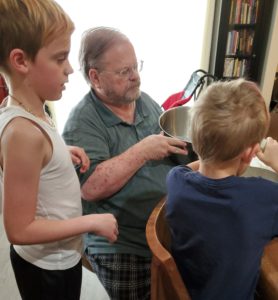 reasoned that he could help the two boys, one 12 and one 6. The 12-year-old wouldn’t need much help. I would help the girls, one 10 and one 14, with special needs. The 10-year-old is creative and fairly independent. That should work out alright.
reasoned that he could help the two boys, one 12 and one 6. The 12-year-old wouldn’t need much help. I would help the girls, one 10 and one 14, with special needs. The 10-year-old is creative and fairly independent. That should work out alright.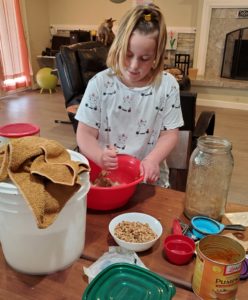 NOT! Don couldn’t manage two at a time and was totally involved with the six-year-old. That left me with three. As for the twelve-year-old, I discovered that when it comes to cooking, he needed a lot of help. And as far as the 10-year-old goes, she couldn’t read my cursive. Of course, her recipe card was in my cursive. Sigh. It was like trying to wrangle chickens. You’ve never done that. Well, trust me, it’s tiring!! And here is another thing. I am perfectly aware that expectations can do a good project in. I teach that. I am an expert.
NOT! Don couldn’t manage two at a time and was totally involved with the six-year-old. That left me with three. As for the twelve-year-old, I discovered that when it comes to cooking, he needed a lot of help. And as far as the 10-year-old goes, she couldn’t read my cursive. Of course, her recipe card was in my cursive. Sigh. It was like trying to wrangle chickens. You’ve never done that. Well, trust me, it’s tiring!! And here is another thing. I am perfectly aware that expectations can do a good project in. I teach that. I am an expert. cream the sugar and shortening, no problem. Then they will cook their cookies, we will eat some and each will clean up their spot on the table. WHAT WAS I THINKING!!!
cream the sugar and shortening, no problem. Then they will cook their cookies, we will eat some and each will clean up their spot on the table. WHAT WAS I THINKING!!!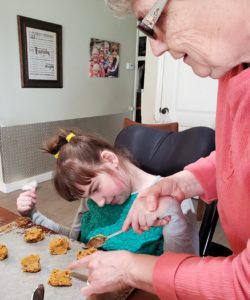 I have to say, that
I have to say, that 
 “A 92-year-old, petite, well-poised and proud man, who is fully dressed each morning by eight o’clock, with his hair fashionably combed and shaved perfectly, even though he is legally blind, moved to a nursing home today. His wife of 70 years recently passed away, making the move necessary. After many hours of waiting patiently in the lobby of the nursing home, he smiled sweetly when told his room was ready.
“A 92-year-old, petite, well-poised and proud man, who is fully dressed each morning by eight o’clock, with his hair fashionably combed and shaved perfectly, even though he is legally blind, moved to a nursing home today. His wife of 70 years recently passed away, making the move necessary. After many hours of waiting patiently in the lobby of the nursing home, he smiled sweetly when told his room was ready.
 I have a friend who has a tiny poodle named Isadore. When I last visited her, she complained that he is spoiled rotten. He wants to be held all the time. She said Isadore drips water from his chin when he drinks and so the floor is always a mess. She sighed in exasperation.
I have a friend who has a tiny poodle named Isadore. When I last visited her, she complained that he is spoiled rotten. He wants to be held all the time. She said Isadore drips water from his chin when he drinks and so the floor is always a mess. She sighed in exasperation.
 When my grandson, Jack, was three, Mary was just one and Maggie was five, I taught them about germs and hygiene. It was chaotic. Mary was on the table and into everything. Jack wanted his way. Maggie, of course, needs LOTS of help. Whew. Did they get any of that? Despite all my preparation and planning, I was sure that the whole thing had been a big fat flop!
When my grandson, Jack, was three, Mary was just one and Maggie was five, I taught them about germs and hygiene. It was chaotic. Mary was on the table and into everything. Jack wanted his way. Maggie, of course, needs LOTS of help. Whew. Did they get any of that? Despite all my preparation and planning, I was sure that the whole thing had been a big fat flop!
 Recently, I was having a conversation with a friend about connecting daily with children. I mentioned that random touch was one of the most powerful practices I knew for connecting multiple times a day.
Recently, I was having a conversation with a friend about connecting daily with children. I mentioned that random touch was one of the most powerful practices I knew for connecting multiple times a day.

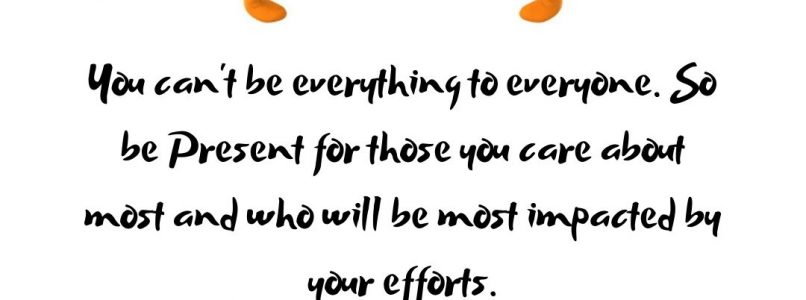
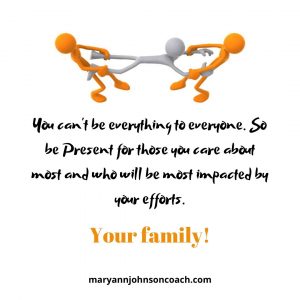 I saw an insurance commercial in which the adults (portrayed by kids) were being treated like children by the insurance company. They felt helpless, undervalued, and frustrated. When I saw this commercial, I, like most of you, could relate to those feelings. At the end of the commercial, a rival insurance company helped a woman (portrayed by a child) with her needs. She stood there smiling, feeling good.
I saw an insurance commercial in which the adults (portrayed by kids) were being treated like children by the insurance company. They felt helpless, undervalued, and frustrated. When I saw this commercial, I, like most of you, could relate to those feelings. At the end of the commercial, a rival insurance company helped a woman (portrayed by a child) with her needs. She stood there smiling, feeling good. of my relaxing and fun things to-do list. I was feeling some pressure. My 3-year-old daughter, Marie, kept coming into the sewing room and interrupting me. This and the sewing were wearing on my nerves. I was ready to spank her. After all, she was bugging me, and she could see perfectly well that I was busy! I decided if she interrupted me again, I was going to swat her.
of my relaxing and fun things to-do list. I was feeling some pressure. My 3-year-old daughter, Marie, kept coming into the sewing room and interrupting me. This and the sewing were wearing on my nerves. I was ready to spank her. After all, she was bugging me, and she could see perfectly well that I was busy! I decided if she interrupted me again, I was going to swat her.